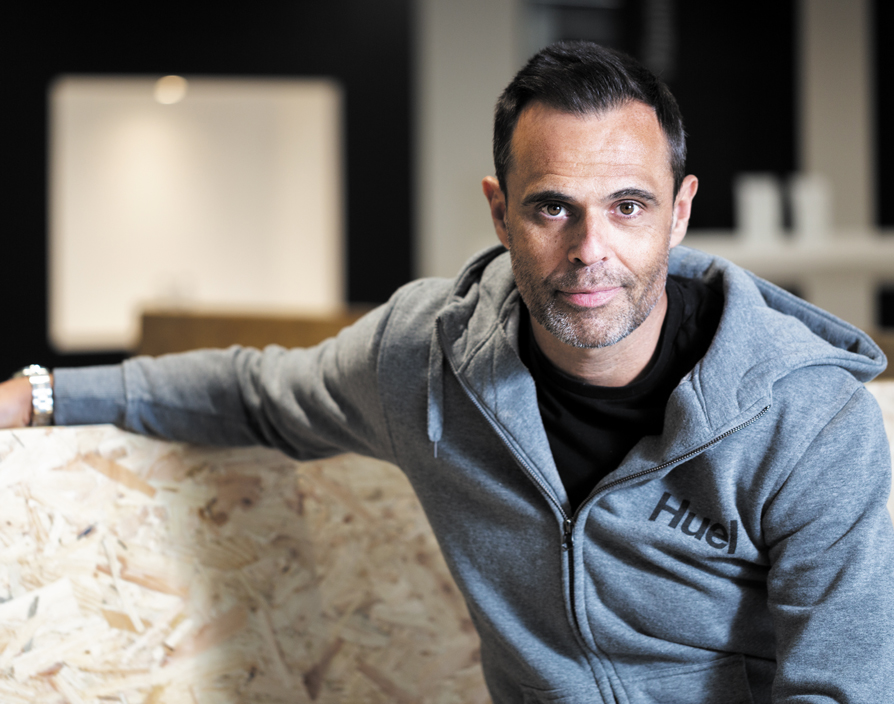“Don’t be a dick.” The words are written in bold black letters on the white wall. Just feet away, roughly a dozen people huddle over their computers, organising marketing efforts and engaging with customers across different forums. Upbeat rap music plays from the speakers across the facility. The song is part of the collaborative playlist every employee can add tracks to, which means it includes an eclectic range of everything from RnB to rock. This is the new global headquarters of Huel, the meal replacement startup.
The company offers a selection of powder-based and ready-made drinks, bars and granola. Each snack promises the scaleup’s dedicated fans – the affectionately called Hueligans – a complete meal with all necessary nutrition. The idea is to replace the forgettable meal deals busy professionals wolf down during their lunch breaks. No muss, no fuss, just healthy snacking. If any of the workers labouring away at their desks would doubt the mission, they can just look up at the words written on the wall encouraging them to “Do the right thing,” remember that “Brand is fucking important” and to always prioritise “Nutrition first, taste a close second.”
These guidelines combined with Huel’s mission to provide convenient healthy food have yielded some impressive results. “This is technically the fastest growing company in the UK at the moment,” argues Julian Hearn, the co-founder. The company launched in 2014 and today its products are available in over 80 countries. Between 2018 and 2019 its sales jumped by 185% to over £40m with 2.7 million meals sold in January this year alone – representing essentially one meal being purchased per second. Moreover, in October last year it raised a £20m venture round. About £1m of that cash injection was invested in the new Tring HQ where roughly 50 out the company’s over 80 global employees can make good use of the company’s gym, kitchen and 15 meeting rooms. There’s even a small gift shop. The facility also doubles as a testament to the company’s aspirations. “It’s an office where we can hold 150 people without any rejigging,” declares Hearn.
Huel’s success is the accumulation of years of grit and the experience gathered during his first two startups – the associate online marketing startup Mash Up Media and the failed fitness venture Bodyhack.
Although, arguably, his first foray into entrepreneurship happened decades ago when a seven-year-old Hearn took advantage of his mum’s greenhouse. “Me and our next door neighbour made a little stall, took the plants and sold them,” Hearn laughs. While he can’t remember if it was his own or his mother’s idea, the concept proved so successful she had to grow more plants because of the demand her son created. “I suppose that was the first time I’d done anything like that,” he recalls.
It would take roughly 30 years before he flexed his entrepreneurial muscles again. In the meantime Hearn did what he refers to as “the normal route,” meaning he acquired a degree in marketing at Bournemouth University before embarking on a 15-year-long career clocking up time with heavyweights like Starbucks, Tesco and Waitrose.
This changed when Hearn and his wife began to try for a baby. By then, he felt the weight of the daily three-hour commute from Aylesbury to London. “It was a bit much,” he recalls. “I was leaving the house at half six in the morning and was home at half six at night and I just thought I needed to find a better way.”
Failing to find suitable employment closer to home, Hearn eventually had a brainwave after attending a marketing affiliate event in Norwich. “I met some guys who were making serious money,” he states. Their online marketing businesses intrigued him. Not only were they earning hundreds of thousands of pounds but were doing so from the comfort of their homes. “They weren’t rocket scientists,” he continues. “They were just normal guys and I thought ‘You’ve got a pretty good lifestyle and you seem like normal guys so why can’t I do what you do?’” Inspired, Hearn decided to follow their example.
For the next year his days were spent as the head of online marketing at price comparison site Dialaphone. At the same time, every evening and weekend were devoted to him “learning the tricks of the trade” of his new side hustle. “I realised that there was an opportunity they hadn’t seen,” he recalls. “They were very focused on keyword voucher codes or discount codes and weren’t focusing on promotional codes.” After a few initial attempts proved successful, Hearn decided it was time to work at it full-time.

Convincing his wife to give it six months and a £1,500 investment of their own money, Mash Up Media was born in 2008. While other founders may’ve been nervous, Hearn trusted the insights accumulated in the year prior. The gamble soon paid off. “Within three months I was making more money than I’d been making from my salary,” he says. The next three years saw Hearn “making a couple of million pounds per year.” In March 2011, he exited by selling the business and its website PromotionalCodes.org.uk to an American company. “I was 40 at that point and had enough money that theoretically I could retire if I wanted to,” he remembers.
Following the exit, Hearn and his wife enjoyed their success. “We didn’t go completely mad with the money,” he says. Instead, they bought a second house by the coast and spent most of their time with their son, enjoying being a family. However, the peace and quiet didn’t last for long. “I got itchy feet,” Hearn confesses. “That was the problem. Being at home all the time with your wife and young child, it was getting a little bit cabin feverish. I wanted something else to do on the side.” But it was more than itchy feet – fatherhood also motivated the decision to find something to do three days a week. “I didn’t want my son to see me at home all the time,” Hearn admits. “He needed a role model, somebody to see working and being at home all the time is probably not a great role model.”
The idea behind his second startup Bodyhack came from him being fed up with the conflicting fitness and dietary advice he was bombarded with. From paleo diets and intermittent fasting to HIIT workouts and heavy dumbbell sets, there’s seemingly no singular method everyone can get behind. “It becomes very frustrating,” he sighs. But then Hearn started thinking – what if there was a platform that trialled different health plans to find out which ones actually yielded the best results? “I thought there is an opportunity because if it has bugged me it has probably bugged other people as well,” he says.
Kicking off his new venture, Hearn and three other people embarked on four different 12-week programmes. Each human guinea pig had to be meticulous in how they recorded their progress – every nibble, dumbbell curl, cardio session and body weight fluctuations had to be accounted for. “It was extremely strict because you had to keep things scientific to keep it as provable as possible,” Hearn explains. And his own workouts generated some stunning results. “I personally went down from 21% body fat to 11% body fat,” he says. “I was about 40 at the time and that was the leanest I’d ever been in my entire life.”
The only problem was that people didn’t believe Hearn was as shredded as he claimed despite the picture proof provided. “People are quite used to being shown fake photographs,” he explains. “That was the feedback we got, [people saying] ‘These are fake. These are photoshopped.’” To prove the results once and for all, two weeks later he shot a video of himself. “You can’t photoshop it in the same way,” he says.
While this video helped convince some detractors, Bodyhack had bigger problems. The company had the ambition of getting 100 different programmes onto the platform. However, it was a costly endeavour in terms of time and money to get people to try the 12-week plans. And even if Hearn had managed that, the dietary needs were too complicated for clients to follow. “People wanted the results but it wasn’t practical for some people to eat that type of food when working,” he explains. “It’s very difficult to stop working at 11 o’clock and get a pot and pan out and cook an egg and 100 grams of broccoli.”
Even though he closed down the project, this insight made him wonder if eating healthily could become as easy as having a protein shake. “That was obviously super convenient because all you had to do was to just put water in, scoop out some protein and put it in,” he says. Drawing inspiration from the concept, he reached out to different nutritionists to find a way to create a shake that included all the essential nutrients people need. Some were less than enthusiastic whilst others like James Collier, who ended up co-founding Huel, were more optimistic. “So I paid him to do a consultation,” Hearn explains. “Two weeks later he’d devised a formula pretty similar to the formula we have today.”
When asked about the taste, Hearn laughs. “The first version was totally unflavoured and had a certain taste to it,” he remembers. “[It was] very earthy and sort of natural tasting but at the same time it’s not what the majority of the population is trained to eat.” Expanding on the subject, Hearn argues people are primed to neglect nutrition in favour of flavours. “You could live your whole life if you lost all your taste buds and if you lost all of your smell you’d be fine as a person,” Hearn explains. “You’d live. But if you took all the nutrition out of your food, you’d die. Nutrition is what food is supposed to provide primarily. Taste is secondary. Unfortunately, if you go to most supermarkets then nearly all food is the other way around. They design food on a taste basis and maybe think about nutrition very late whereas we think about nutrition first and think about taste second.”

Still, earthy taste or not, he believed he was on to something huge and decided to invest £220,000 of the Mash Up Media money into the new venture. “I felt fine about it but my wife [was] a little bit hesitant because I’d burnt probably £80,000 on Bodyhack,” Hearn laughs. Nevertheless, he managed to convince her this was a project worth betting on and so, in 2014, Huel – short for Human Fuel – was born.
This meant facing many challenges. Some, like the branding and edits to the marketing copy, were reasonably easy to solve by using different freelancers. Similarly, there was no need to hire a model for the marketing photos as Hearn, who was still in the best shape of his life, was happy to pose for the pics. Even the site required minimal coding after the founders decided to use Shopify’s e-commerce solutions. “I’m not saying it was easy but it was doable,” Hearn shrugs.
Other obstacles were tougher to overcome. “The hardest thing was actually to get the product made in the early days,” Hearn admits. “That just took forever and was super difficult.” The problem wasn’t so much finding manufacturers but convincing them Huel wasn’t like other new food businesses that failed to live up to expectations, with huge costs as a result. “For a factory to change their production line and deal with a new product that’s probably going nowhere is probably not going to be worth their time and effort,” he explains.
But Huel’s luck was seemingly about to change. “Eventually we found this big multinational that said ‘[We’ll] do this for you, no problem,’” Hearn remembers. And for about four months he considered it sorted. Then the manufacturer suddenly made a 180 and decided not to go through with it after all. “That was a key point at which I felt ‘This is it,’” he says. “This was way into a year after we first started and I thought, ‘These guys are just letting me down. This is never going to go anywhere.’ I nearly gave up.”
Luckily, Hearn decided to give it “one more crack” and soon found the manufacturer Huel’s been using to this day. “They were quite a small operation at the time and now we’re their biggest client and they have been able to grow and scale up with us,” he states. “So it’s been a very good relationship.”
With the drink finally manufactured after 18 months, Hearn soon found his first customers. Surprisingly, it wasn’t through his marketing efforts but via him chatting on the Facebook group London Startups and somebody asking what Huel was actually doing. “I explained what I was launching and they must’ve gone through and checked the site out before we actually launched and that’s how our first initial customers came – through that Facebook group,” he explains.
Once the product was officially launched in June 2015, the founding team knew their investment had been worth it. Not only was the national press interested but the exploding numbers of freshly converted Hueligans also blew Hearn away. “I’ve worked for some good brands before [but] the engagement I saw, I hadn’t really seen that from customers,” he says. Passionate customers from the UK and even France started sending Huel pictures posing with the shakes. “When I started seeing people like that coming back in the early days, I thought ‘Yeah, this is definitely going to go somewhere,’” he smiles.
As the community grew, Huel actively engaged with customers on its own forum and actioned the insights gained from these conversations. “It’s really made the product better,” Hearn argues. For instance, while his wife and friends were put off by the earthy flavour, most Hueligans disliked the sweetened versions. “When we launched, the feedback from a lot of people was that it was too sweet,” he says. “We tend to attract people who [are] very nutritionally aware and want something that’s healthy for them. People are looking for really healthy food, something that’s really good for them. They don’t want it to be confectionary in taste.” Fortunately, with the company being direct-to-consumer, Huel has been able change the flavours according to both early and later customer insights within just a few months.

Fast adaptability like this saw Huel quickly attract customers as far afield as Dubai and China. However, Germany was the first country it opened an international office in. “They’re a big country and that was our biggest selling country outside of the UK,” Hearn says, adding that the cultural and geographical proximity also played into the expansion. Even though Huel certainly benefitted from the nation’s huge number of professionals – not to mention its thriving startup scene – some slight differences made the expansion occasionally challenging. For instance, Hearn and his team had to figure out how to make up for Germany’s ban on working on Sundays to ensure a consistently high turnaround.
Another hurdle was to find a way to make people change their eating habits. “In the UK the most popular lunch is quite clearly the sandwich and we see ourselves as a very viable alternative,” Hearn says. The way he explains it is that both bread and the shakes are made from powder, which makes convincing people to level up their meals easier. But in Germany, things are a bit trickier. “They actually still go out quite a lot for cooked food at lunchtime, which we didn’t realise,” he explains, pointing to the doner kebab as a firm favourite. “Huel is not as directly comparable to eating out or eating cooked food. So for some people it is possible it seemed more alien in Germany than it does in the UK.”
But difficult as it might be to expand Huel’s operations into Europe, it was child’s play compared to entering the US in 2017. “To export food into America is very difficult,” Hearn claims. “You have to go into FDA rules [which] are quite specific and problematic.” Because of this, Huel was forced to find an FDA-approved Canadian manufacturer to ship it down to the States. Moreover, the scaleup had to solve everything from finding reliable suppliers to the packaging to get it up to the same standards as in the UK. “Most of the issues have really been about starting afresh over there,” Hearn says, admitting that it’s still something the company is working on.
He doesn’t mind the hard work though. “If you don’t enjoy problem solving then starting a business is not going to be right for you,” he says. And his work ethic is clearly an advantage to stay ahead of the competition.
Huel seemingly arrived just as the market was inundated with meal replacement startups. Over the past few years scaleups like Soylent, Queal and dozens of other brands with similar concepts have tried to solve the issue of convenient healthy eating. Pointing at societal issues like booming obesity and health issues, Hearn believes it’s clear why these companies are so successful. “People are getting more nutritionally aware,” he says. While he’s seemingly uncomfortable talking about his competition as he doesn’t “know their businesses that well,” he argues that Huel stands out in the crowd due to its uncompromising attitude to nutrition over taste. “We try to make the best things that we can rather than just making a profit,” Hearn says.
Huel also differs because of the founder’s initial reluctancy to seek outside investment and would rather live off the company’s profit. “We’ve been approached by 30 plus VCs and some real top tier VCs as well,” he remembers. The usual answer was “thanks but no thanks.” But his attitude was in for a readjustment. Noticing how other startups in the space were able to scale rapidly thanks to VCs’ cash injections, he began to contemplate if there might be something to it. However, he truly changed his mind when Huel had to stock up for the busy months coming up after the Christmas of 2017. “We did get a little bit tight at that point in terms of money in the bank,” he recalls.
After debating it, the board decided to seek investment to avoid a similar crunch again. The following summer, the scaleup negotiated a deal with the VC firm Highland Europe to raise a £20m venture round. Huel’s leadership was also able to leverage the fact that it was in a good financial position in those months. “So we were able to negotiate a very good deal,” Hearn smiles. To date, most of it is saved for a rainy day. “The vast majority is sat in the bank for opportunities or problems that may arise so we could deal with them,” Hearn explains.
He’s now aiming to make Huel a £250m company within the next four years and to potentially exit the business at some point. But no matter what form a potential exit may take, Hearn’s adamant he’ll stay until he’s confident it will survive. “These things are rare,” Hearn concludes. “You don’t want to rest on your laurels. It can happen where people think things are going fine, they chill out, go on a holiday in Barbados and then suddenly you’ve killed what you’ve started. So I’m still heads down on Huel at the moment.” ![]()
Share via:


















































